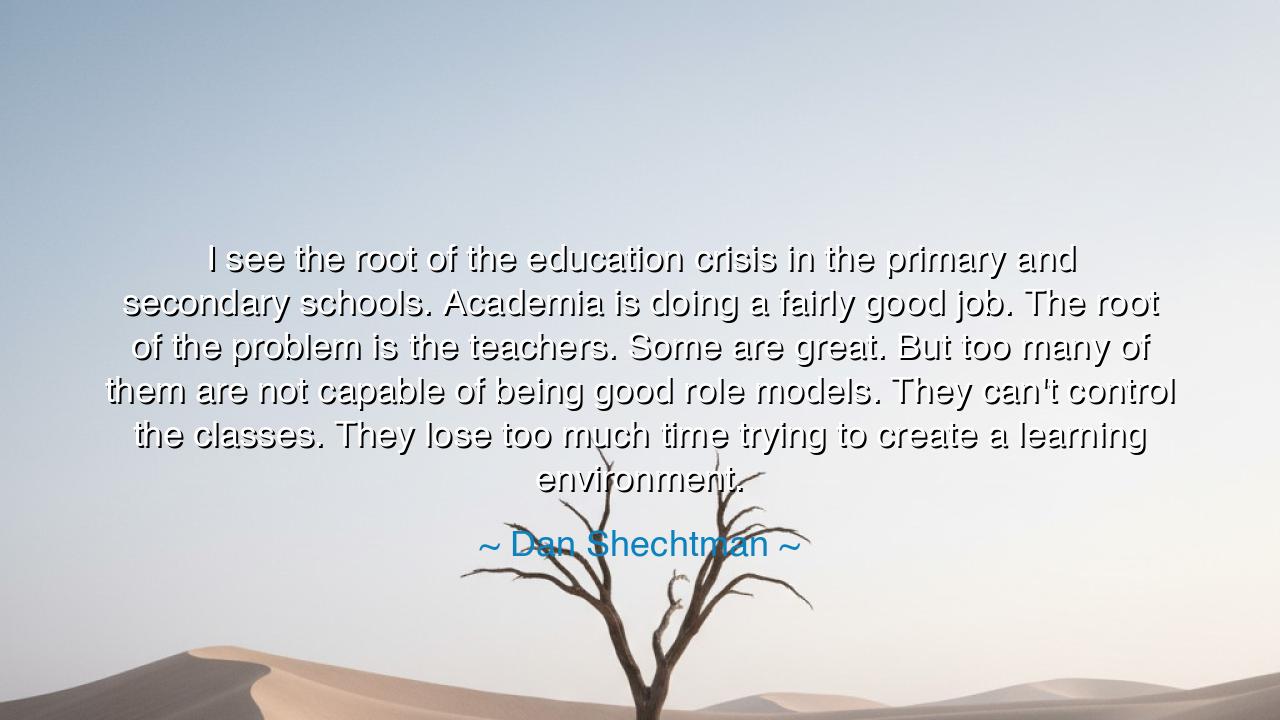
I see the root of the education crisis in the primary and
I see the root of the education crisis in the primary and secondary schools. Academia is doing a fairly good job. The root of the problem is the teachers. Some are great. But too many of them are not capable of being good role models. They can't control the classes. They lose too much time trying to create a learning environment.






In the words of Dan Shechtman: “I see the root of the education crisis in the primary and secondary schools. Academia is doing a fairly good job. The root of the problem is the teachers. Some are great. But too many of them are not capable of being good role models. They can’t control the classes. They lose too much time trying to create a learning environment.” These words pierce to the heart of an eternal question: who shapes the soul of a nation’s children? It is not the rulers, nor the scholars at the heights of academia, but the humble teachers who labor in the earliest years of a child’s journey. If these falter, the roots of society weaken.
The ancients knew the sacred duty of teachers. Confucius declared that the stability of the state begins with the cultivation of virtue in the young, and Socrates walked the streets of Athens stirring questions in the minds of youth. They understood that teachers are not merely transmitters of facts—they are role models, embodying discipline, curiosity, and integrity. A poor role model poisons the spirit of the student, while a great one awakens hidden greatness. Shechtman’s lament is not against the profession itself, but against the neglect that allows too many classrooms to become battlegrounds rather than sanctuaries of learning.
Consider the story of Maria Montessori. At a time when many saw “unruly” children as lost causes, she transformed her classroom into a place of respect, structure, and wonder. By commanding not with fear but with presence and wisdom, she created a true learning environment where children flourished. Her life reveals the truth of Shechtman’s words: the crisis does not lie in the ability of children to learn, but in the ability of teachers to guide, control, and inspire.
History also offers darker lessons. In times when nations neglected the training of their teachers, the decline was swift. The late Roman Empire, distracted by politics and war, allowed the quality of its schools to crumble. Teachers were poorly paid, unmotivated, and uninspired. As discipline waned and standards decayed, the empire’s intellectual vigor withered. What Shechtman observes in his age echoes this ancient warning: if teachers are ill-prepared, then the education crisis is inevitable, no matter how strong the universities may seem.
The struggle to create a learning environment is not simply about order in the classroom. It is about dignity. A teacher who cannot control a class cannot command respect, and without respect there can be no learning. The child sees chaos and mirrors it; the classroom becomes noise, not growth. Yet when a teacher stands firm, calm, and wise, even restless spirits are drawn into discipline, and the room transforms into a sanctuary of thought. In this way, every classroom becomes a seedbed of civilization—or a breeding ground of its decay.
The lesson is clear: if society desires strong citizens, it must first cultivate strong teachers. It must honor them, train them, and demand of them not only knowledge, but character. Parents must support them, children must respect them, and leaders must invest in them. A nation that underpays or undervalues its teachers will reap ignorance. A nation that exalts and empowers its teachers will reap wisdom. For it is they who shape the roots of the tree of learning, and without strong roots, the tree cannot stand.
Therefore, O listener, take this teaching to heart: honor your teachers, for they carry the burden of forming the future. If you are a teacher, strive not only to inform but to inspire; not only to command but to embody the virtues you would awaken in others. If you are a parent, stand beside them; if you are a leader, strengthen them. For as Shechtman declares, the true battle of the education crisis is not fought in universities, but in the classrooms where the youngest minds are first shaped. Win that battle, and you win the future.






AAdministratorAdministrator
Welcome, honored guests. Please leave a comment, we will respond soon